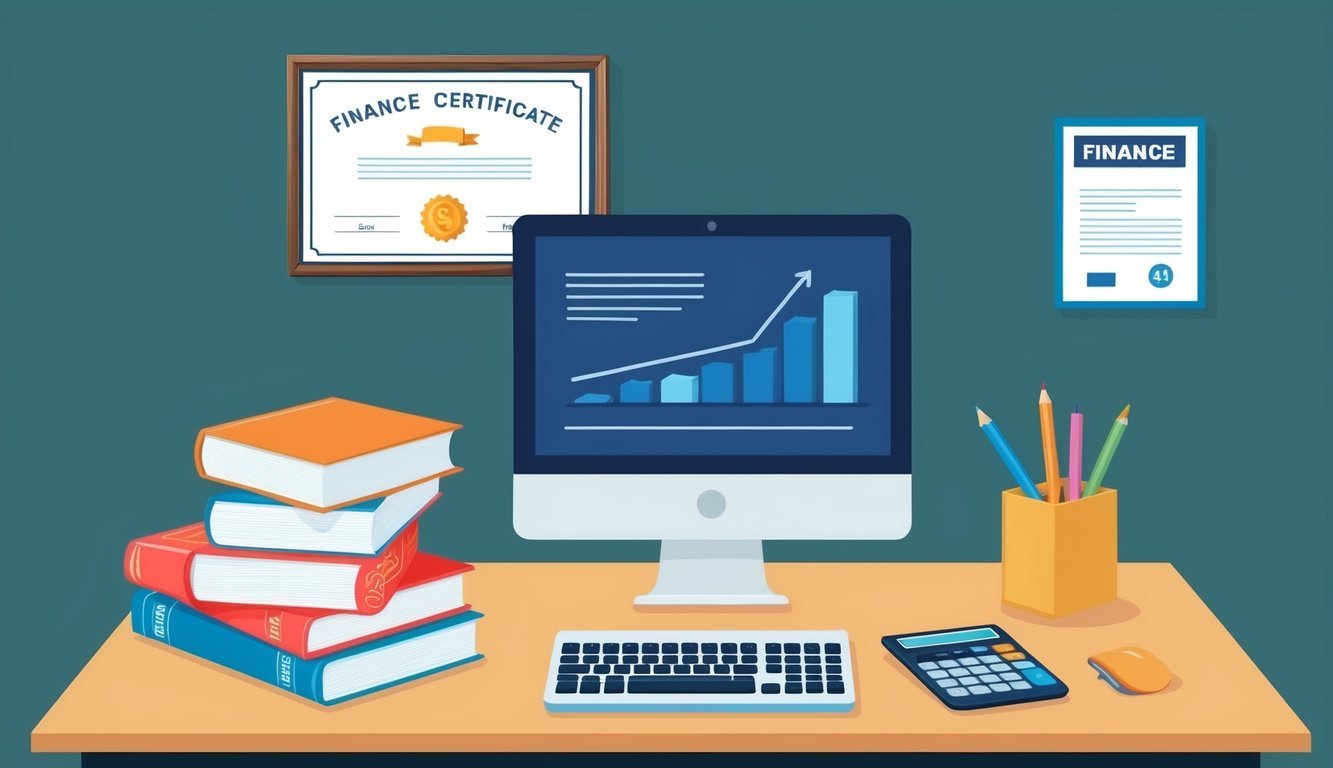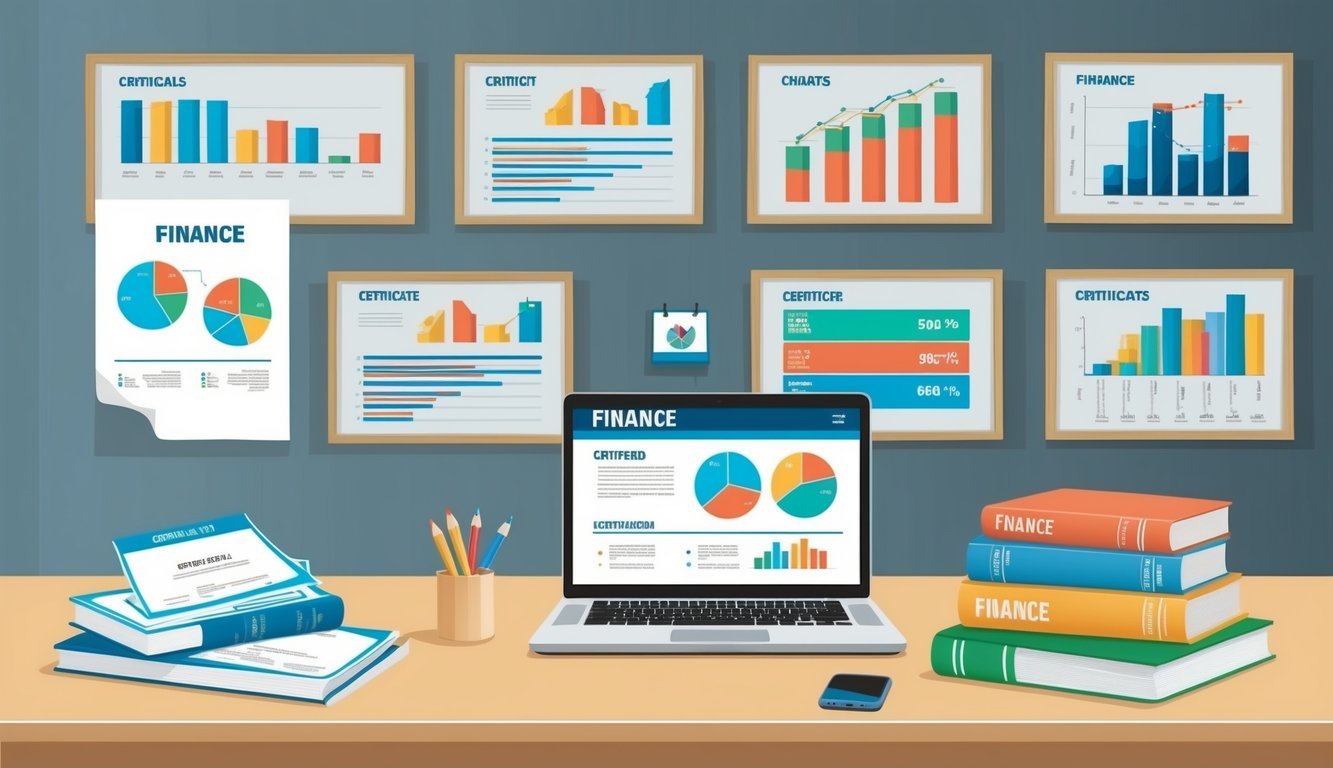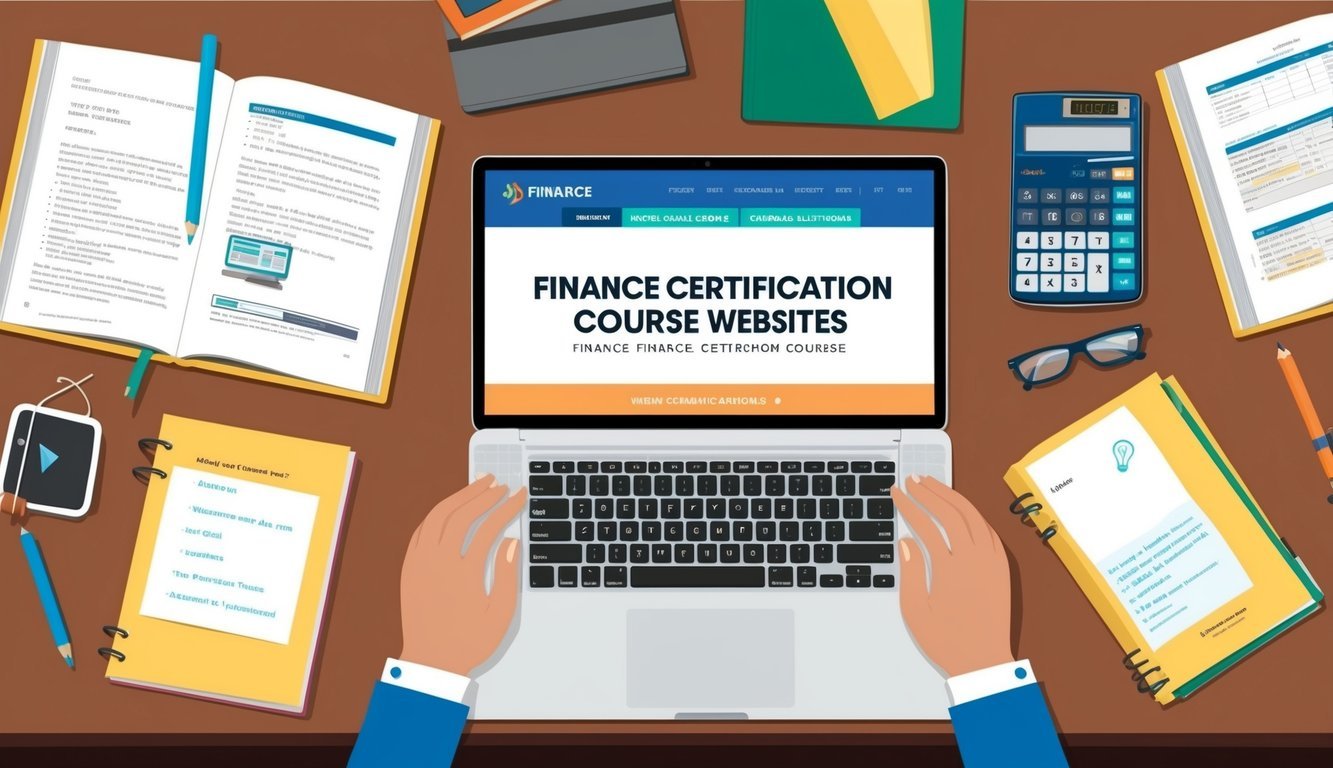Thinking about ramping up your finance career? Getting a finance certification can really give you the edge you need.
These programs aren’t just about ticking boxes; they equip you with vital skills and signal to employers that you know what you’re doing.
Whether you’re fresh on the job market or eyeing a promotion, certifications can help you shine brighter than the competition.
alt=”A desk full of finance certification books and a laptop ready for action”>
Finance certifications can boost your earning potential and unlock new job doors. No matter if you’re just starting your journey or looking to climb higher, there’s a certification that aligns with your goals.
Let’s check out five top-notch finance courses that can elevate your career.
These programs not only provide essential skills but also enhance your finance expertise.
Plus, many professionals find that diving into quality management courses gives them that extra edge in leadership and organization.
Combine your financial savvy with management skills to present yourself as a well-rounded candidate for higher-level roles.
Ready? Let’s dive in!
1) Chartered Financial Analyst (CFA)
Ever thought about becoming a top-tier investment pro? The CFA Program could be just the ticket you need.
Sure, it’s a challenging path, but it’s totally worth it!
The CFA is often dubbed the gold standard in investment circles.
You’ll dive into a range of topics—ethics, economics, financial analysis, you name it.
These skills aren’t just theoretical; they’re practical and immediately applicable in real-world investing.
Passing three levels of exams is your ticket to earning that coveted CFA charter.
Each level is progressively tougher, but the good news is you can take them at a pace that works for you, usually around four years total.
Another cool perk? The CFA is recognized globally.
You can take your skills with you anywhere.
Plus, it opens opportunities in asset management, research analysis, and corporate finance.
But this journey is about more than just exams.
You’ll become part of a global network of finance professionals, with plenty of chances to learn and connect with others.
2) Certified Financial Planner (CFP)
Are you aiming to excel in the world of financial planning? The CFP certification might just be what you need.
It’s a solid credential that proves you’re knowledgeable in helping clients manage their finances.
This certification will require some serious study on topics like investments, taxes, and retirement planning.
Sure, it’s demanding, but it’s a fantastic way to stand out.
The CFP exam is no cakewalk, so pick a good study program to help you prepare.
Options range from online classes to in-person sessions.
Once you’ve earned your CFP, you’ll be the go-to person for helping folks navigate their financial futures.
Keep in mind, achieving your CFP takes commitment, but it’s an excellent way to show you’re serious about a career in financial planning.
3) Financial Risk Manager (FRM)
Got a knack for managing financial risks? The Financial Risk Manager (FRM) certification could be your perfect fit.
Offered by the Global Association of Risk Professionals (GARP), it’s highly respected in the industry.
The FRM exam focuses on critical areas like market and credit risk and operational risk.
You’ll learn how to identify and tackle various financial risks companies face.
Becoming certified requires passing two exams: the first part delves into risk management tools, while the second is all about applying those tools in real scenarios.
Employers really value the FRM designation, which can give you an edge when applying for jobs in risk management, banking, or investment firms.
The exams are tough, but don’t fret! There are tons of study materials to help you prep.
You can choose from self-study or take preparatory courses.
Grabbing your FRM can open the door to exciting roles like risk analyst, portfolio manager, or perhaps even a chief risk officer one day.
4) Certified Public Accountant (CPA)

Dreaming of climbing the ladder in accounting? The CPA certification is your golden ticket.
Sure, it’s a bit of a beast, but the rewards are great!
CPAs are always in demand.
They have the flexibility to work in public accounting, join big companies, or even venture out on their own.
The opportunities are endless!
To become a CPA, you’ve got to tackle a challenging exam that covers auditing, business concepts, and financial accounting.
No worries though—there are excellent prep courses to guide you along the way.
Becker CPA Review is a top-notch choice, established since 1957 and trusted by major accounting firms.
You’ll also find options like Becker’s CPA prep courses, catering to various needs and budgets.
You can find what fits you best.
The CPA exam isn’t exactly a walk in the park, but with determination and the right prep, you can absolutely conquer it.
Once you succeed, you’ll join the elite ranks of accounting professionals.
Plus, tapping into the best CPA exam review courses can really enhance your study experience, giving you solid materials and expert guidance to boost your chances of success.
These courses usually come packed with practice exams and tools designed to cement your understanding of tricky accounting concepts.
Embrace these resources, and you’ll be on your way to a rewarding accounting career.
5) Chartered Alternative Investment Analyst (CAIA)

Looking to carve out your niche in alternative investments? The CAIA Charter could be just what you need.
This certification hones in on areas such as hedge funds, private equity, and real assets.
It’s ideal for anyone looking to explore the more unique facets of investing.
To snag the CAIA Charter, you’ll need to pass two exams, and you can take them one at a time.
The first exam covers the fundamentals, while the second dives into more advanced topics.
Once you ace both exams, you’ll still need some work experience, but after that, you’ll be in good company with other finance pros.
One great thing about the CAIA curriculum is that it gets updated every year, ensuring you stay in the loop with the latest trends and research in alternative investments.
For those just starting out, why not check out the Fundamentals of Alternative Investments program? It’s a neat way to get your feet wet before plunging into the full CAIA curriculum.
Understanding Finance Certifications

Finance certifications can seriously elevate your career and earning potential.
They signal to employers that you have specialized knowledge and skills in the finance arena.
The Importance of Certification in Finance
Getting certified in finance is a big deal—it shows you’re committed to your career and have expert knowledge.
Many employers actively search for certified financial planners when they’re hiring.
Certifications make you stand out among other candidates.
They demonstrate that you’ve put in the effort to acquire advanced skills, which can lead to better job offers and an increase in pay.
Some finance roles actually require specific certifications.
Having the right ones can open new doors for you.
How Certifications Enhance Careers
Finance certifications can really give your career a boost.
They often lead to promotions and salary increases.
Many certified professionals earn more than their non-certified peers.
Certifications also provide networking opportunities with other finance professionals.
Whether it’s in classes or industry events, these connections can lead to exciting job opportunities.
Pursuing certification shows you’re dedicated to keeping your skills fresh.
It confirms that you’re staying up-to-date in your field, making you more attractive to employers and clients alike.
Preparing for Certification Exams

Getting ready for finance certification exams isn’t a walk in the park.
It takes time and dedication, along with a solid plan to balance work and study.
Study Materials and Resources
To crush your finance certification exam, grab the right study materials. CFP exams typically need about 3–5 years of preparation.
Start with official guides from the certifying body—they’ll tell you exactly what you need to study.
Textbooks and practice questions are super important.
Many folks also find online courses to be a lifesaver since they break down tough topics into manageable bites.
Don’t underestimate the power of study groups.
Talking through complex concepts with others can really deepen your understanding.
Plus, it’s nice to have some support from peers who are in the same boat.
Balancing Work and Study
Juggling a job and exam prep can feel daunting, but it’s totally manageable.
First up, set a study schedule.
Carve out specific times each week to hit the books.
Try to study when you’re most alert.
If you’re a morning person, rise early to study before work.
Night owls might be better off studying in the evenings.
Use your lunch breaks wisely too! Even just 30 minutes can really add up.
Weekends can be the prime time for studying, but don’t forget to take breaks—burnout isn’t going to help you ace that exam.
Consider taking a little time off before the exam for some intense review.
Many find this final push can make a world of difference.
Frequently Asked Questions

Finance certifications can definitely add a boost to your career, but picking the right one can be a bit tricky.
Let’s tackle some common questions to make your decision a little easier.
With so many options available, assessing your career goals and industry needs is essential.
Some folks lean towards the CFA or CPA credentials, while others check out top business analytics courses to enhance their data-driven skills.
Understanding what each certification entails will help you make an informed decision.
Which finance certifications can beginners start with?
If you’re just stepping into finance, the Certified Financial Planner (CFP) certification is a fantastic starting point for you to learn about personal finance.
Another good option is the Financial Risk Manager (FRM) certification, which gives you a solid grounding in risk management.
Are there any finance certification courses available for free?
While most respected certifications come with costs, you can find some free introductory courses online.
Platforms like Coursera and edX offer free finance courses to help you get started.
These won’t lead to a certification, but they’re a great way to get your feet wet.
What are some short-term finance certification courses to consider?
If you’re looking for a quick resume boost, consider the Certified Government Financial Manager (CGFM) certification.
It focuses on government finance and takes less time to complete than many other options.
The Certified Internal Auditor (CIA) is another short-term option that can open doors in auditing.
Which finance certifications hold the most prestige and recognition?
The Chartered Financial Analyst (CFA) certification is widely regarded as the gold standard in finance.
It’s challenging, but you’ll earn immense respect for it.
The Certified Public Accountant (CPA) certification also has a stellar reputation, especially in accounting and auditing roles.
How worthwhile is it to pursue a certificate in finance?
Investing in a finance certification can really pay off over time.
For instance, the CFP certification might set you back around $2,000, but it could lead to high-paying jobs with affluent clients.
The FMVA certification sharpens your analytical skills, making you better at financial modeling and data analysis.
What’s considered the toughest finance certification to obtain?
The CFA certification is generally thought to be the most demanding.
It requires passing three tough exams and having four years of work experience.
The Chartered Alternative Investment Analyst (CAIA) certification isn’t a cakewalk either, especially if you’re not already familiar with alternative investment strategies.

